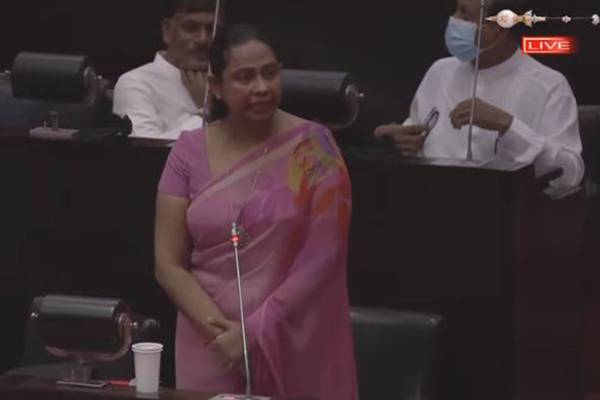The first round of the COVID-19 vaccine, when it is released to the market, will be received by 4.2 million Sri Lankans, Health Minister Pavithra Wanniarachchi said in Parliament yesterday.
In response to questions posed by Opposition Leader and Samagi Jana Balawegaya (SJB) Member of Parliament (MP) Sajith Premadasa, Wanniarachchi explained that the first round of the vaccine will target 20% of the population.
She added that authorities followed discussions about COVID-19 vaccines from the start and even joined COVAX, which is co-led by Gavi, the Coalition for Epidemic Preparedness Innovations (CEPI), and the World Health Organisation (WHO).
According to WHO, the aim of COVAX “is to accelerate the development and manufacture of COVID-19 vaccines, and to guarantee fair and equitable access for every country in the world.” Besides vaccines for at least 20% of a country’s population, COVAX also offers a diverse and actively managed portfolio of vaccines, immediate delivery of vaccines upon availability, an end to the acute phase of the COVID-19 pandemic, and the rebuilding of economies.
Wanniarachchi added that a national committee has been appointed to look into COVID-19 vaccines despite vaccines still being in trial stages with no fixed date for when they will be available to the public. She added that three technical subcommittees will be focusing on matters like target groups for the vaccine, prioritisation, cost, and usage.
In terms of other measures implemented by the Government to contain the spread of COVID-19, Wanniarachchi said there are currently 34 PCR machines, 1,020 ventilators, and 704 ICU beds in State hospitals. She went on to say that 25 PCR machines, 220 mobile ventilators, and 61 ICU beds were added to the State hospital system since the COVID-19 outbreak.
She added that the 25 centres for PCR testing were sufficient for patient treatment management at present. “Steps are being taken to increase this number in future and, through State intervention, funding has been set aside from organisations like the World Bank and Asian Development Bank to build new PCR laboratories in State hospitals.”
According to Wanniarachchi, of the 25 PCR machines set up in State hospitals, 11 were purchased through funding from the Asian Development Bank for Health Ministry projects and 14 were contributions from local and foreign organisations. She stated that 200 mobile ventilators and 20 ICU beds were also received in this manner.
The Health Minister went on to say that 16 automatic extractors with robotic arms are in use in State hospitals and that two high-capacity fully automated PCR machines have been set up at the Colombo East Base Hospital and the Bandaranaike International Airport.
In terms of the rapid antigen test kits, Wanniarachchi stated 4,000 tests have been carried out thus far. “Epidemiologists are yet to state a necessity for antigen tests to monitor the spread of the virus in the country,” she said, explaining that the antigen test is currently carried out when deciding if patients with symptoms can be discharged from treatment centres, and to test if an individual has previously been infected.
Wanniarachchi stressed that all decisions on COVID-19 prevention are taken based on recommendations of epidemiologists. The antigen tests will be used in prevention measures as soon as epidemiologists indicate to such a need.
Regarding the origins of the Divulapitiya COVID-19 cluster, Wanniarachchi stated that the Inspector General of Police had directed the Criminal Investigation Division to carry out an extensive investigation into the matter following orders from the Attorney General.
While a report has been submitted based on preliminary investigations, Wanniarachchi said she would present to Parliament the findings of the extensive investigation once they are submitted.
“Between 2 August and 3 October, COVID-19 patients were not detected from the community. During this period, a large volume of random testing was carried out but patients were not identified,” she added.
In response to a question from SJB MP Mujibur Rahman, Wanniarachchi said that, at present, when a COVID-19 death occurs, the individual’s family makes the decision on the coffin and where it is purchased from. However, if they are unable to do so, State officials contact various donors in order to provide the family with what they require.
(FT)

